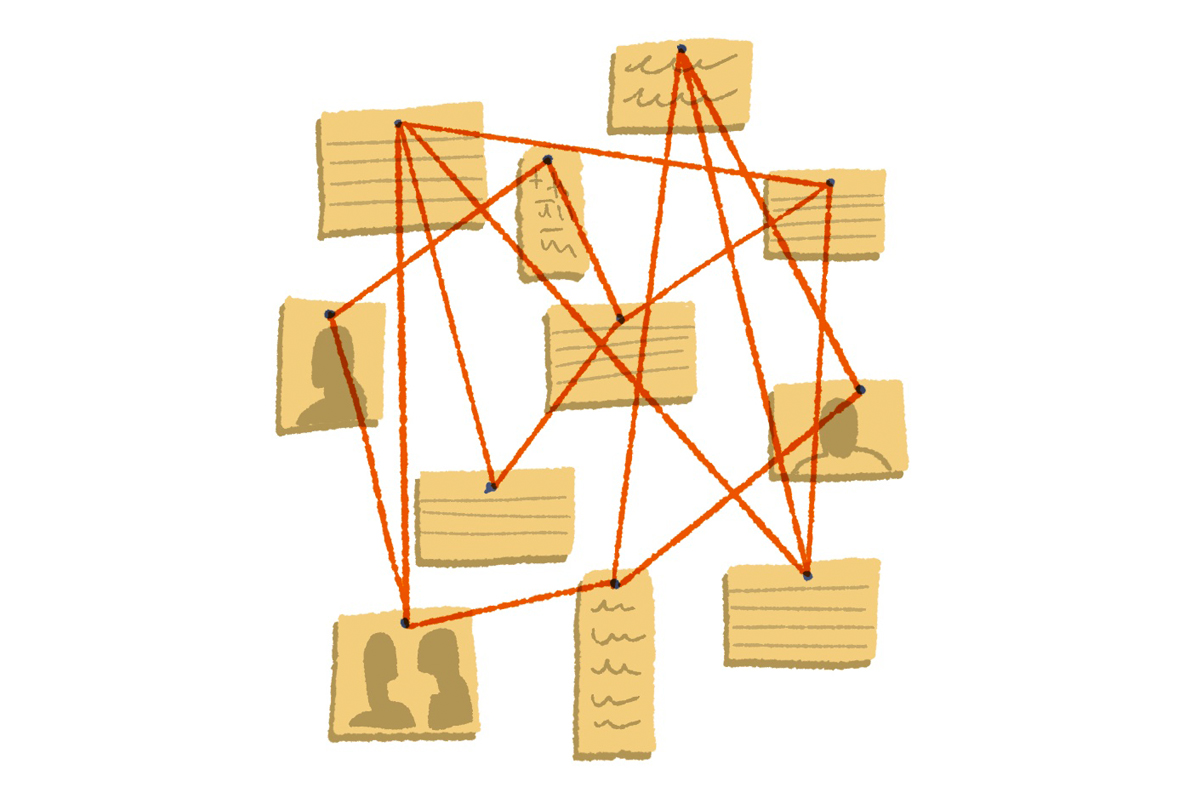
POLITICS / NOVEMBER 2024
Welcome to the Poilievre Conspiracy Theory Vortex
Adopting absurd narratives has become a staple of right-wing politicking
BY TIMOTHY CAULFIELD
ILLUSTRATION BY JAMIE BENNETT
Published 7:44, Sep. 18, 2024
This past April, far-right radio host and supplement salesman Alex Jones endorsed Pierre Poilievre, noting that he is the “real deal” and “is saying the same things as me.” And by “the same things,” he mostly means the legitimization of conspiracy theories about “globalist elites” and the World Economic Forum.
When Jones sounds off about something—be it Hillary Clinton’s demonic sex trafficking ring, how the chemicals the US government is adding to water are turning frogs gay, or how the Sandy Hook shooting was staged—it is safe to assume he’s spectacularly wrong. That’s the default. But this time, Jones is on to something. A merging of the Jones and Poilievre world views.
Look, I’m no fan of the WEF. It is hard to cheer for a gathering of private-jet-owning 0.01 percent-ers in expensive casual wear pontificating about world issues. But let’s be honest: when Poilievre complains about “globalist Davos elites,” he isn’t upset about the crassness (or the carbon footprints) of the uber rich hanging in a Swiss ski resort. He is very obviously playing to a base that has embraced the paranoid belief about a secret plot to control the world and take away our basic rights. And he wants their votes.
He has blown similar misinformation dog whistles for the anti-vaccine, climate-change-denial, and anti-trans crowds. (Okay, that’s often the same crowd.) He wants their votes too.
Obviously, in-group flag waving has a long tradition in politics. (Indeed, a penchant for virtue signalling is a common criticism levelled against Justin Trudeau.) Still, it is monstrously depressing that we live in an era where politicians can so easily leverage absurd conspiracy theories for political gain. If Canada gets a Poilievre government, will the country get more of this BS?
I recognize this sounds like a partisan rant about conservative politics. In fact, I fully concede that the embrace of harmful misinformation happens across the ideological spectrum—such as the (mostly) left-leaning fear mongering about nuclear energy and GMOs. In the 1960s and ’70s, it was the left that was more distrustful of science and public institutions. And, most recently, we saw politically motivated speculations about the Trump assassination attempt. So context, topic, and history matter. But in this cultural moment, adopting shadowy narratives has become a staple of right-wing politicking. Poilievre, alas, seems to fit this pattern.
And research suggests those who identify as conservative are more prone to believe conspiracy theories. As noted in a 2020 study from Cambridge University, “conservatives in the United States were not only more likely than liberals to endorse specific conspiracy theories, but they were also more likely to espouse conspiratorial worldviews in general.” Other studies come to similar conclusions. A 2021 study from Indiana University explored the impact of social media echo chambers and partisanship on vulnerability to misinformation. The researchers concluded that, while the association is present across the ideological spectrum, it is stronger among conservative social media users. An Ohio State University study, also from 2021, found that conservatives perform “worse at distinguishing truth from falsehoods,” likely due, at least in part, to the fact that “falsehoods tend to promote conservative positions.” Indeed, for some topics, conspiracy theories—such as those surrounding vaccines—seem to be driven largely by ideological affiliation.
There are complex, interrelated variables that may explain these trends among conservative voters. They include socio-economics (e.g., less education), psychological tendencies (e.g., more likely to think intuitively), consumption of right-wing media (e.g., when repeated enough, tall tales start to feel true), and reacting negatively to scientific facts (e.g., vaccines work, climate change is happening, etc.) that run counter to a politically informed position—something that, according to a recent study, both conservatives and liberals do.
But much of it relates to identity. Politicians endorse conspiracy theories to secure votes, transforming these theories into ideological markers for their political base. This, in turn, amplifies the value of spreading such fabricated stories.
Thus, an ever-accelerating conspiracy theory vortex is created. Once someone believes one such theory, it becomes easier to believe others. It fuels polarization and diverts attention away from more important (and real) social issues toward bogus concerns, as evidenced by recent laws and policy recommendations designed to respond to chemtrails (Tennessee now bans them), fifteen-minute cities (Edmonton will not allow Hunger Games–ish districts, phew), and mRNA vaccines.
Poilievre can’t control who endorses him. But the fact that one of the world’s most notorious liars says he’s on Team Poilievre should give us all pause.
The spread of conspiracy theories has been recognized as one of the greatest threats facing our world. Indeed, a recent survey by UNESCO, involving respondents from sixteen countries, found that 87 percent believe misinformation “has already had a major impact on the political life in their country.”
Now, more than ever, we need political leaders who are willing to champion the truth. Is Poilievre that leader?




